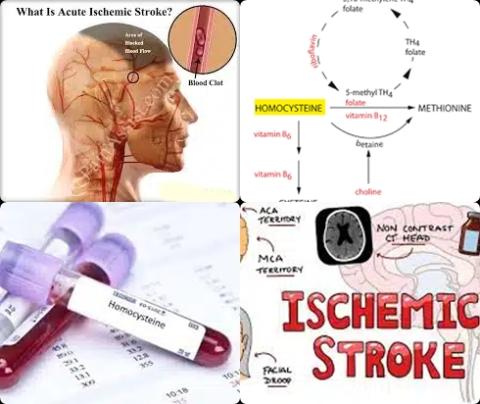
Objectives:
Is an increased homocysteine (Hcy) level an independent predictor of unfavorable outcomes in acute ischemic stroke (AIS)?
Study design:
This review article included 17 cohort studies (4 of them were retrospective studies and the remaining 13 were prospective studies) with 15,636 patients with acute ischemic stroke.
There was no publication bias.
Results and conclusions:
The investigators found the patients with acute ischemic stroke group had significantly higher levels of homocysteine than the control group [SMD = 5.11, 95% CI = 1.87 to 8.35, p = 0.002].
The results of subgroup analyses on ethnicity showed that the associations were statistically significant in both Caucasian and Asian patients [Caucasian: OR = 3.56, 95% CI = 2.54 to 4.98, p 0.00001, I2 = 20% and Asian: HR = 1.39, 95% CI = 1.19 to 1.63, p 0.00001, I2 = 86%], but not in African patients [OR = 1.04, 95% CI = 0.99 to 1.10, p = 0.11].
The investigators found, moreover, high homocysteine levels were closely associated with gender, B12 deficiency, smoking and patients who received tissue plasminogen activator treatment.
However, no significant difference was found between increased homocysteine levels and age, drinking, hypertension, diabetes mellitus and hyperlipidemia.
The investigators found, in addition, the cut-off value (20.0 μmol/L) might be an optimum cut-off index for acute ischemic stroke patients in clinical practice.
The investigators concluded that the homocysteine level may serve as an independent predictor for unfavorable survival outcomes in acute ischemic stroke patients, particularly in Caucasian and Asian acute ischemic stroke patients. Further studies can be conducted to clarify this relationship.
Original title:
The Prognostic Value of Homocysteine in Acute Ischemic Stroke Patients: A Systematic Review and Meta-Analysis by Huang S, Cai J and Tian Y.
Link:
https://www.ncbi.nlm.nih.gov/pmc/articles/PMC7907516/
Additional information of El Mondo:
Find more information/studies on cardiovascular disease right here.